Bash scripting is a powerful skill that enables users to automate tasks and streamline processes within the Linux command-line environment. At the heart of effective Bash scripting lies the manipulation of strings, as strings serve as fundamental building blocks for various operations. Understanding how to work with strings is crucial for scriptwriters aiming to create dynamic and efficient code.
In the realm of Bash scripting, strings are ubiquitous—used for storing text, filenames, and other data types. Whether it’s constructing file paths, generating dynamic messages, or manipulating textual information, the ability to concatenate strings plays a pivotal role in script development.
This article aims to guide both beginners and intermediate Bash scripters through the intricacies of string manipulation, focusing specifically on the essential skill of concatenating strings. Concatenation, the process of combining strings, is a fundamental operation that forms the backbone of many scripting tasks.
By the end of this article, readers will gain a comprehensive understanding of not only the basics of working with strings in Bash but also the nuances of string concatenation. With practical examples and in-depth explanations, we will explore various methods and techniques, empowering readers to enhance their Bash scripting capabilities and tackle a diverse range of real-world scenarios. Whether you’re a novice seeking to grasp the fundamentals or an experienced scriptwriter looking to refine your skills, this article will serve as a valuable resource on the journey to mastering string manipulation in Bash.
Basics of Strings in Bash
In Bash, strings are sequences of characters enclosed within single quotes (‘) or double quotes (“). These quotes define the boundaries of the string, allowing Bash to interpret the enclosed characters as a single entity. Here’s a practical example:
# Single-quoted string single_quoted=’Hello, World!’
# Double-quoted string double_quoted=”Bash is versatile.”
# Displaying the strings “echo $single_quoted” “echo $double_quoted”
In the example above, the variables single_quoted and double_quoted hold strings enclosed in single and double quotes, respectively. The echo command is then used to display the contents of these variables.
Common Operations on Strings
Variable Assignment
Variable assignment is a fundamental operation in Bash, allowing you to store and manipulate strings within your scripts.
# Variable assignment with single quotes my_string=’Hello, Ubuntu!’
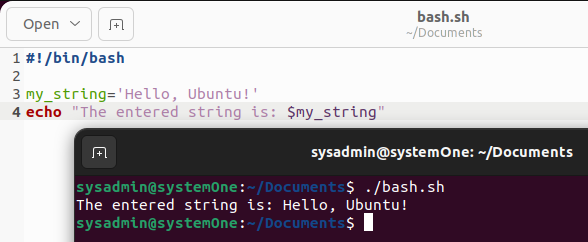
# Variable assignment with double quotes another_string=”Linux is powerful.”
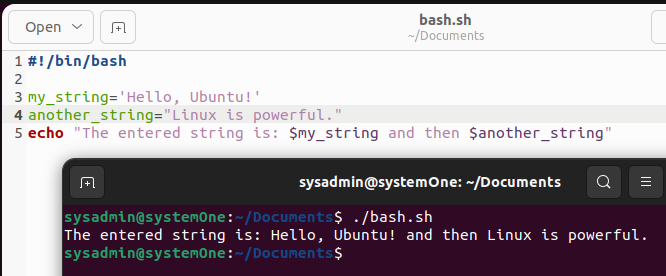
These variables (my_string and another_string) can be further used for string manipulation tasks.
String Comparison
Bash provides operators for comparing strings. Here’s an example of string comparison:
string1='Ubuntu' string2='Linux' if [ "$string1" == "$string2" ]; then echo "Strings are equal." else echo "Strings are not equal." fi
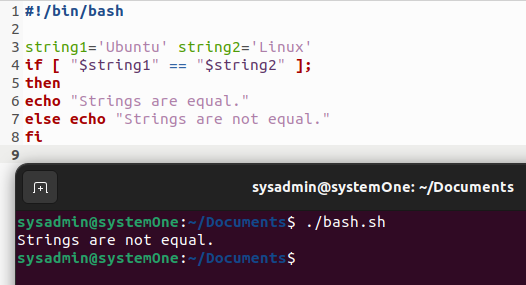
In this example, the script compares the values of string1 and string2 and prints a corresponding message based on the result.
String Length
Determining the length of a string is useful in various scripting scenarios. The ${#string} syntax provides the length of a string.
my_string='Bash is amazing.'
length=${#my_string}
echo "The length of the string is $length characters."
This script calculates and displays the length of the my_string variable.
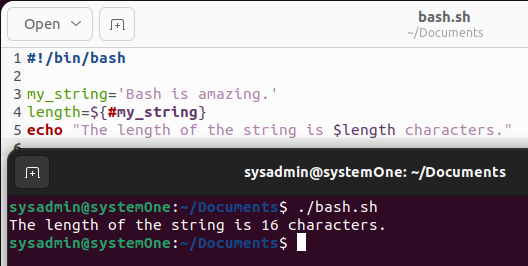
These basic string operations serve as the foundation for more advanced tasks like concatenation, which we’ll explore in the following sections. As we progress, these fundamental skills will prove essential for effective string manipulation in Bash scripts on Ubuntu 22.04.
Concatenating Strings
String concatenation is the process of combining two or more strings to create a new string. In Bash, this operation is crucial for building dynamic content within scripts. Concatenation allows you to merge the contents of different strings, facilitating the creation of more complex and adaptable text.
Using the + Operator for Concatenation
The + operator is one way to concatenate strings in Bash. However, it’s essential to note that the + operator behaves differently in Bash than it does in some other programming languages.
Example Code Snippets
# Using the + operator for string concatenation string1=’Hello,’ string2=’ Bash!’ result=$string1$string2 # Displaying the concatenated string echo $result
In this example, string1 and string2 are concatenated using the + operator (without any spaces). The result is stored in the variable result and then displayed.
Limitations and Considerations
While the + operator can be used for concatenation, it’s important to understand its limitations. Unlike some other programming languages, Bash does not have a dedicated string concatenation operator. Using the + operator may work in simple cases, but it’s not as versatile as other methods, especially when dealing with variables and complex expressions.
Using the += Operator for Concatenation
The += operator provides a more robust and flexible approach to string concatenation in Bash.
Demonstrating Its Usage
# Using the += operator for string concatenation greeting='Hello,' name='John' greeting+=$name # Displaying the concatenated string echo $greeting
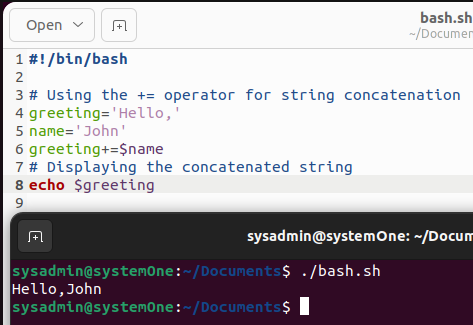
Here, the += operator appends the content of the name variable to the greeting variable. The result is a concatenated string.
Advantages Over the + Operator
The += operator is advantageous over the + operator because it can directly operate on variables, making it more versatile in dynamic scripting scenarios. It also provides a clearer syntax for concatenation, especially when dealing with larger or more complex strings.
Understanding these methods of string concatenation equips scriptwriters with the tools needed to manipulate and combine strings effectively in Bash on Ubuntu 22.04. As we explore more advanced techniques in the subsequent sections, the versatility of these operators will become even more apparent.
Using Command Substitution for Concatenation
Command substitution is a powerful feature in Bash that allows the output of a command to replace the command itself. It provides a way to capture the result of a command and use it within a script or assign it to a variable. This functionality becomes particularly useful when combined with string concatenation, enabling dynamic and efficient scripting.
Incorporating Command Substitution in String Concatenation
# Command substitution in string concatenation current_date=$(date '+%Y-%m-%d') file_name="backup_$current_date.tar.gz" # Displaying the concatenated string echo "Backup file name: $file_name"
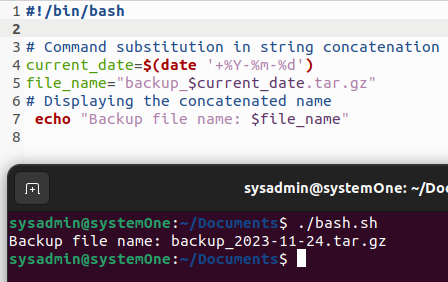
In this example, the date command is used with command substitution ($(…)) to capture the current date in the specified format. The result is then concatenated with the string “backup_” to create a dynamic file name.
# Command substitution with command output as part of a sentence word_count=$(wc -w < example.txt) # Displaying the concatenated sentence echo "The sample text contains $word_count words."
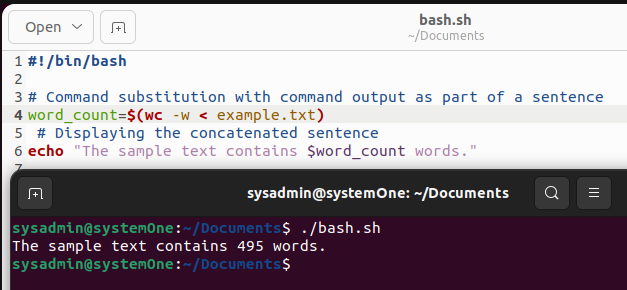
Here, the wc command is employed to count the number of words in a file (sample_text.txt), and the result is incorporated into a sentence using command substitution.
Benefits and Use Cases
- Dynamic Content Generation: Command substitution enables the creation of dynamic content by incorporating the output of commands directly into strings. This is particularly useful for generating file names, timestamps, or any information derived from command output.
- Efficient Scripting: By using command substitution, you can avoid the need for temporary variables, making scripts more concise and efficient. This is beneficial when dealing with complex concatenation tasks within limited script space.
- Real-time Information: Incorporating command substitution in strings allows scripts to capture real-time information, ensuring that the concatenated content reflects the latest results of executed commands.
Command substitution, when combined with string concatenation, offers a powerful and flexible mechanism for incorporating command output into your scripts. This capability significantly enhances the dynamic nature of Bash scripting, making it a valuable tool for various automation and scripting scenarios on Ubuntu 22.04.
Conclusion
Mastering the art of string concatenation in Bash is an essential skill for any scripter or developer navigating the world of shell scripting. As we’ve explored various methods, from basic operators like + and += to advanced techniques involving command substitution and string interpolation, we’ve empowered ourselves to wield these tools effectively. String concatenation is not merely a technicality but a gateway to solving real-world problems, such as constructing file paths dynamically or generating dynamic messages in scripts. By understanding the nuances, troubleshooting common issues, and exploring practical applications, we’ve laid a foundation for efficient and robust string manipulation in Bash. As you continue your scripting journey, remember that mastery of strings is a powerful asset, opening doors to more sophisticated and intricate shell scripts. Happy coding!




Leave feedback about this